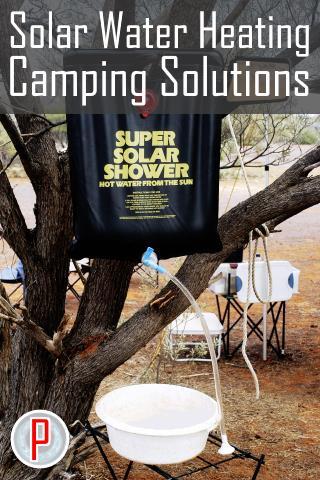
Campsite Solar Water Heating Overview
This will help you understand the range of options you have when it comes to using solar energy to heat water at a campsite.
We'll consider what you need to use hot water for, in addition to thinking about some of the equipment you may already have, and with this information to hand you'll be able choose the options that suit you best.
Before we go any further, let's make sure we're on the same page. The definition of 'portable' that I'm talking about refers to systems that can be readily packed and stowed. This means I won't be talking about the types of RV solar water heaters involving permanent or semi-permanent installation.
Contents
The Two Main Ways of Using the Sun to Heat Water
1. Solar Thermal Energy
The simplest method is to use Solar Thermal Energy - this just means using the heat energy coming from the sun to directly heat water. In its simplest form this can mean using DIY solutions where you leave a heat absorbing container filled with water in sunlight until it warms up, or it can involve using specially designed solar collecting bags to capture the sun's radiant heat.
- These types of portable water heaters tend to be low cost and low maintenance, and don't usually take much time to set up. And if you're camping with young children, they will have a reduced risk of severe burns because this method doesn't usually heat water to dangerous levels.
- The major disadvantage, when compared to using an electric powered water heater, is that they don't store their heat for as long as batteries store their power. If you don't need heated water early in the morning, then this won't be so much of an issue for you.
Thermal Water Heater Advantages
Thermal Water Heater Downsides
2. Solar Power
This is also sometimes referred to as Solar Electricity and is the power you get from solar panels.
A common camping solar power setup is to generate power from portable solar panels and store it in 12V battery packs - these are typically either lead-acid or lithium ion batteries.
You can then use a 12V immersion water heater (a heating element which you place inside a water container) or kettle depending on what equipment you have and how much water you need to heat and how hot you want the water with a kettle being the best option for boiling small amounts of water.
You can also buy power inverters that convert 12V DC to 110V or 240V AC to use with items designed to work with mains power, however this usually involves having a large battery system which is only practical for RVs or large vehicles due to the amount of weight of lead acid battery systems which are typically used for this purpose.
That being said, there are portable lithium ion battery packs that are gaining in popularity such as the Goal Zero range of power packs which can put out USB (5V DC), 12V DC and 110V AC and can be recharged from wall outlets or portable solar panels - Goal Zero supplies those as well, as do many other manufacturers..
- If you already have a solar power setup for camping then you can buy 12V heaters, kettles and portable shower systems and when you use them you're not generating greenhouse gasses as you do when you use gas or propane powered systems.
- They use a lot of power which you may want to use for other things like charging GPS.systems, radios, mobile phones, tablets etc.
Solar Power Water Heater Advantages
Solar Power Water Heater Downsides
Hot Water Camping Needs and Popular Solutions
Here we take a look at the main uses for hot water when camping and which heating options you can use.
Some portable solar water heating setups can get complex, heavy and even a bit pricey, so let's look at what you need hot water for and see if there are better alternatives in some cases.
Cooking, Making Hot Beverages or Anytime You Need to Boil Water
If you have the kind of serious coffee addiction that I have, then this is the most important reason you'll have for boiling water - a much more energy intensive process than merely warming it up. I generally use a portable propane stove when I want fast results, or when we don't have a fire lit, otherwise I use the fire.
Personally I wouldn't use solar electric power for the energy intensive task of bringing water to the boil unless I already had the gear and didn't need to buy it (which I do have when I go on trips with my father) and I had an excess of electricity stored up and could replenish it easily in the event bad weather rolled in causing the solar panels to slow down or stop producing electricity. When I have a portable generator available, I try to avoid using it due to the amount of noise they make.
If you do want to boil water this way, and many do, then you can use a simple 12V kettle which has the advantage of being able to use your vehicle's power as well as solar power. An example is the Aleko Car Portable Travel Electric Kettle.
So which option for boiling water is best for the environment?
There's no simple answer here because in addition to considering the relative energy efficiency of each method, you have to take product life-cycles into account by considering the net environmental degradation of sourcing raw materials, manufacturing, distribution and eventual disposal. However, if you don't already have a solar electric setup, and your fuel comes from a renewable source, then you'll produce less pollution by using a heating source such as a wood fire or alcohol stove, like this one from Esbit, fueled with renewable ethanol.
For example, if you use wood that you've collected from the ground, then apart from potentially denying some small critters a food source or a home, you'll be adding no net carbon to the environment in the long run because the wood would have eventually decomposed and released all of it's carbon content back to the environment.
An important note about propane is that although a team of scientists from Imperial College London published a paper in Nature Communications back in 2014 describing the process they invented for producing renewable propane, the propane canisters currently on the market are produced using non-renewable fossil fuels.
Cleaning Camping Gear and Personal Grooming
I avoid cleaning my gear with heated water, including cookware and utensils. Cold or ambient temperature water works just fine so long as you clean straight away and don't let the mess or grime set in.
On the other hand, I will admit that personal washing and shaving are more pleasant if the water is warmed up a bit, however you don't need to bring water to its boiling point for these tasks, so solar thermal heating should be sufficient. And remember, that when camping you have license not to shave (this is usually my preferred solution).
Immersion or Bucket heaters running off your solar power are great for this purpose. A good example is the RinseKit Hot Rod Water Heater which uses 12V DC.
Camping Showers
Although you can get gas powered camping showers, for solar heating you have two main options - thermal or electric.
You can also get a range of accessories to go with either of these types of solar camping showers, such as a shower stand or even a complete privacy/shower tent.
Thermal Portable Solar Showers
Thermal solar heating is a good option and usually much cheaper than some of the more complex electric or gas powered options. The main downside is that you typically need to let them warm up in the sun for a couple of hours, but they are comparatively light-weight and many can be carried in a backpack.
In their simplest form they are comprised of a heat absorbing water bag which you hang up to gravity feed the water into a hand-held shower head like the Seattle Sports PVC-Free Sun Shower.
You can also get pressure fed ones that you manually pump pressure into, like the Nemo Helio LX Pressure Shower, but the downside is that they cost more and tend to be more prone to developing leaks over time than gravity fed ones.
12V Camping Showers
These have the advantage of heating the water instantly and you can use your vehicle's power to run them if you're running low on solar power.
The simplest ones let you draw water from a bucket and pump it to the shower head so you don't need to hang them up. Here is a low cost example from Amazon.
There are also much more capable systems available that can heat the water and pump it under pressure. These provide a great shower experience at the cost of using more power and they need to be transported in a vehicle. Rinsekit make a couple of different sized systems that have all these features plus the water container can double as a cooler.
Finally, another alternative is to use a 12V Immersion heater to heat the water, then pour the heated water into a gravity or pressure fed portable shower - the RinseKit Hot Rod Water Heater is just the thing for that.


